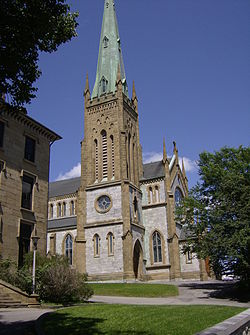Cathedral of the Immaculate Conception (Saint John, New Brunswick)
| Cathedral of the Immaculate Conception | |
|---|---|

Cathedral of the Immaculate Conception
|
|
| 45°16′42″N 66°03′23″W / 45.2783°N 66.0564°WCoordinates: 45°16′42″N 66°03′23″W / 45.2783°N 66.0564°W | |
| Location | Saint John, New Brunswick |
| Country | Canada |
| Denomination | Roman Catholic |
| Website | http://dioceseofsaintjohn.org |
| History | |
| Founder(s) | Most Rev. Thomas Connolly |
| Consecrated | 1855 |
| Architecture | |
| Status | Cathedral |
| Functional status | Active |
| Heritage designation | Provincial Heritage Place |
| Architect(s) | Charles F. Anderson |
| Architectural type | Norman-Gothic |
| Groundbreaking | May 1853 |
| Specifications | |
| Length | 200 feet |
| Width | 116 feet |
| Nave width | 80 feet |
| Spire height | 230 feet |
| Administration | |
| Diocese | Diocese of Saint John |
| Clergy | |
| Bishop(s) | Most Rev. Robert Harris |
 |
|
The Cathedral of the Immaculate Conception in Saint John, New Brunswick, Canada is Cathedral of the Roman Catholic Diocese of Saint John located at 91 Waterloo Street in the city's central neighborhood of Waterloo Village.
The building was initiated by the second Bishop of New Brunswick, The Most Rev. Thomas Connolly. Realizing that the Catholic population required a larger facility, Bishop Connolly on November 14, 1852 announced to the congregation his intention to proceed immediately with the erection of the Cathedral. Plans were subsequently prepared in New York City during the winter of 1852-53, the foundation stone was laid in May 1853 and walls were erected and a roof laid by November 1853. The blessing and first mass in the new cathedral were celebrated on Christmas Day.
The task of completing the cathedral fell to Bishop J. Sweeney, the third Bishop of New Brunswick between 1861 and 1865. The spire was erected in 1871. It has a height of 230 feet to the top of the cross, equal to some 300 feet above sea level and about the highest point in the city. In the interior of the edifice the extreme length is 200 feet, the width at the transepts 116 feet and in the nave, 80 feet.
The cathedral chimes, installed in 1885, were first rung on that Christmas Day and consist of ten bells, the largest about 3,000 pounds in weight. The bells were cast especially for the New Orleans exposition, where they were awarded a gold medal. The chime is in the scale of D major, and includes a flat seventh bell, which will permit music in two different keys and forms. The whole chime weighs 12,000 pounds, exclusive of mountings. They were manufactured by the McShane Bell Foundry, Baltimore, Maryland.
...
Wikipedia
